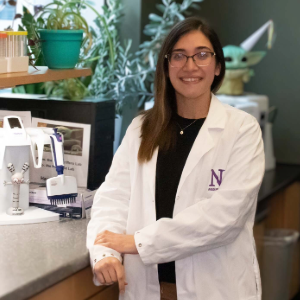
May 2025 Newsletter

May 2025 Newsletter

Student Profile
Estefany Guzman is a dual degree student in the Driskill Graduate Program pursuing both a PhD and MPH. In the laboratory of Judd Hultquist, PhD, assistant professor of Medicine in the Division of Infectious Diseases and of Microbiology-Immunology, she studies pathogens, including COVID-19 and RSV.
Her recent work, published in Nature Communications, found that the surge in RSV cases following the COVID-19 pandemic may have been, in part, caused by increased testing and changes to the RSV genome.
Where is your hometown?
I grew up in Berwyn, Illinois, a beautiful Chicago suburb home to an even more beautiful immigrant community.
What sparked your interest in science or medicine?
I attended the Illinois Mathematics and Science Academy for high school, where our teachers always answered our questions with another question in science class. Although initially frustrating, answering a question and being left with even more unknowns was super interesting. I realized how science opened opportunities for us to appreciate the world's never-ending chasm of information.
What are your research interests?
My research interests involve incorporating population-level data to inform molecular studies in emerging and re-emerging pathogens.
What are you currently working on?
I am currently wrapping up my thesis, which focuses on the genomic surveillance of RSV and the functional implications of emerging mutations in contemporary circulating viruses. We are currently looking to develop viral assays to test whether these new mutations are beneficial for RSV to spread and/or evade current and putative treatments.
Share a defining moment in your education at Feinberg thus far.
In 2024, I traveled to Lima, Peru, and co-led a pathogen genomics workshop at the Center for Technological, Biomedical and Environmental Research (CITBM) at Universidad Nacional Mayor de San Marcos (UNMSM). I was ecstatic to utilize my native language and challenge myself to give a scientific lecture in Spanish. The experience reminded me how essential it is to be out of your comfort zone to learn more about yourself (personally and professionally) and the world.
What do you hope to do with your degree?
I dream of continuing in the infectious disease space as a career scientist who works in interdisciplinary spaces. I hope to also participate in mentorship roles for individuals interested in pursuing doctoral studies in the biosciences, particularly those currently underrepresented in the sciences.